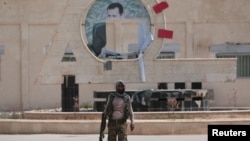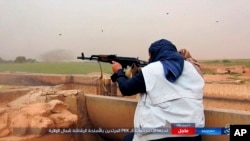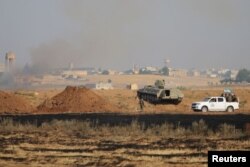Commanders in the Syrian Kurdish militia, the YPG, and the U.S.-led coalition against the Islamic State say Washington's decision to send more arms to the YPG will accelerate their advance into Islamic State's de facto capital, Raqqa.
"We need all types of weapons to complete our war against IS and to capture Raqqa," Nasir Hacimansur, a senior adviser of Syrian Democratic Forces general command, told VOA.
"This American support will significantly expedite and ease the war against IS," he said. "It will also have a very positive psychological effect on our soldiers to see a country like the U.S. is supporting them."
The YPG is a Kurdish militia that leads the Syrian Democratic Forces (SDF), an alliance of Kurdish and Arab forces that has driven IS militants from large swaths of land in northern Syria over the past two years with the backing of the U.S.-led coalition.
The SDF said Wednesday it has ousted IS from the strategically important town of Tabqa, 40 kilometers west of Raqqa, using its assault there to move toward the IS stronghold.
Washington sees arming the Kurdish fighters as the easiest way to bring about Raqqa's downfall. And Kurdish officials have continuously told Washington that the assault on the IS capital could be long and costly for their forces if they are not provided with heavier weapons.
"We need heavy and light weapons for that operation," Hacimansur said. "We are consuming [using] many bullets every day and many of our guns are weary that need replacement. We are also recruiting more people on daily basis as a preparation for the major operation."
U.S. Air Force Colonel John Dorrian, a spokesman for the U.S.-led coalition against IS, said on Wednesday that the YPG will receive the arms in short order. The weapons will include small arms, ammunitions, heavy machine guns, and mortars.
"Some of the equipment and the resources that are going to be [provided] are already in theater, and some of those may have begun being dispersed very quickly. Some will be metered out as it's needed," Dorrian told reporters in a weekly televised briefing from Baghdad. He added that the arms shipments are directly tied to speeding up the Raqqa operation against IS.
IS is showing fierce resistance on the northern outskirts of Raqqa, detonating suicide car bombs and using civilians as human shields.
"We already know how insane the warfare [techniques] of IS are," Hacimansur said. "From our side, there is a limit to what we can use while they are using all type of weapons, including the prohibited ones."
Turkey's response
Washington has previously supplied light weapons and armored vehicles to the Arab element of the SDF. The U.S. has avoided that supply to the YPG because of opposition from NATO ally Turkey, which sees the YPG as an extension of the Turkish-Kurdish separatist PKK.
Turkey expressed outrage Wednesday at the U.S. decision to further arm the YPG.
"Every weapon obtained by the People's Protection Units [YPG] constitutes a threat to Turkey," said Turkish Foreign Minister Mevlut Cavusoglu.
But the coalition spokesman said the coalition will "carefully monitor what is given and what it's being used for."
"We have made sure that those who are receiving these weapons pledge to use them against ISIS and we're going to be watching to make sure that that's how they're used. Any departure from what's been agreed will affect how we operate with partner forces going forward," Dorrian said, using an acronym for Islamic State.
Fawza al-Yusuf, a political leader of Kurdish self-proclaimed Democratic Federal System, told VOA that if the decision had been made earlier, "we would have seen a lot more advances against IS."
Kawa Azizi, a political science professor at Salahaddin University in Iraq's Kurdish region, said that by sending arms, the U.S. is expecting a rapid defeat of IS.
"The U.S. made that decision because its priority for now is to defeat IS both in Mosul and Raqqa," he said. "It wants a group that's only focus is IS, and YPG is that force. Other Syrian groups that the U.S. supported before either disintegrated or turned their focus away to fighting each other and the Syrian regime."
VOA Kurdish Service's Shahed Alavi and Mutlu Civiroglu contributed from Washington.






